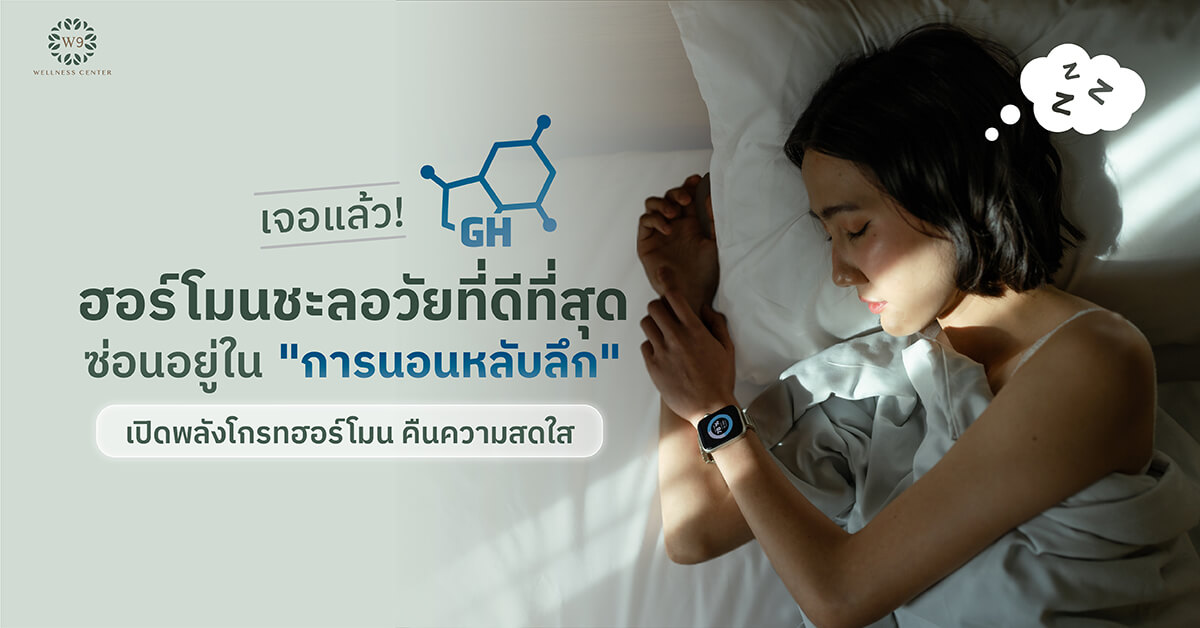
In this era of rapid advancement in health technology, many people are paying more attention to their sleep health. With data from health watches (Smartwatches or Smart Rings) that help track sleep duration, quality, and even sleep scores (Sleep Score) that are clearly processed, we are beginning to question the role of Growth Hormone (GH) To restore the body while sleeping
But have you ever wondered… even though your watch says you've slept "a full hour" or has a good "sleep score," why do you wake up feeling exhausted and not as refreshed as you should? Does your skin look dull and lackluster? Or does your body recover from fatigue more slowly than you expected?
The answer may not lie solely in the “quantity” of sleep, but in its “quality,” especially during “Deep Sleep” (Deep Sleep or Slow-Wave Sleep) This is the golden time when your body will work hard forBody repair And it is a period that growth hormone Which is like “Anti-aging hormones” The power will be fully released.
Growth Hormone (GH) It is the main hormone produced and secreted fromPituitary gland It plays a crucial role in the functioning of the body from head to toe, not only during childhood but also throughout life. AsAnti-aging hormonesThat helps maintain youth and good health
The secretion ofgrowth hormoneIn the body, GH does not occur all the time, but is released in a rhythm. The period when GH is released the most and is most effective is While you are in “deep sleep” Which usually happens during First half of sleep Each night's
If you have trouble falling asleep, have difficulty getting into deep sleep, or have a short period of deep sleep, ejaculationgrowth hormone In the body, it will be significantly reduced, resulting in Unhealthy cycle As follows:
If you find yourself experiencing these symptoms despite trying to get enough sleep, or your health clock shows you've been asleep for several hours, it could be a sign that ejaculation is over.growth hormoneYours is having problems
If you check the information on your health watch and find that Shorter than normal periods of deep sleep Or have Sleep Score that does not correspond to feeling refreshed These are warning signs that it's time for you to prioritize quality.Deep sleepSeriously, to stimulate the work of growth hormone
Ejaculation enhancementgrowth hormoneWhich isAnti-aging hormonesNaturally, it's not difficult if you make appropriate changes to your sleeping habits and lifestyle.
Create excellent sleep hygiene
Nutrition for deep sleep and growth hormone
Proper exercise
Ultimately, good health isn't just about eating healthy, exercising regularly, or using trendy gadgets to track your health. It's about prioritizing “Quality deep sleep” is The key That is often overlooked
Investing in qualityDeep sleep and promoting secretiongrowth hormoneWhich isAnti-aging hormonesProperly prepared, it is a worthwhile investment in your overall health as it helps your body to:Body repairand fully restore yourself, resulting in you having more energy, a stronger immune system and maintainingyouthful skinStay with us as long as possible
Are you ready to start taking a deep health approach to balance your hormones and improve your quality of life?
Praram 9 Hospital (3rd floor, Building A)
Van Cauter E, Plat L. Physiology of growth hormone secretion during sleep. J Pediatr. 1996 May;128(5 Pt 2):S32-7. doi: 10.1016/s0022-3476(96)70008-2. PMID: 8627466.
Olarescu NC, Gunawardane K, Hanson TK, et al. Normal Physiology of Growth Hormone in Normal Adults. [Updated 2025 Apr 18]. In: Feingold KR, Ahmed SF, Anawalt B, et al., editors. Endotext [Internet]. South Dartmouth (MA): MDText.com, Inc.; 2000-. Available from: https://www.ncbi.nlm.nih.gov/books/NBK279056/
Spiegel K, Leproult R, Van Cauter E. Impact of sleep debt on metabolic and endocrine function. Lancet. 1999 Oct 23;354(9188):1435-9. doi: 10.1016/S0140-6736(99)01376-8. PMID: 10543671.
Besedovsky L, Lange T, Born J. Sleep and immune function. Pflugers Arch. 2012 Jan;463(1):121-37. doi: 10.1007/s00424-011-1044-0. Epub 2011 Nov 10. PMID: 22071480; PMCID: PMC3256323.
Leproult R, Van Cauter E. Role of sleep and sleep loss in hormonal release and metabolism. Endocr Dev. 2010;17:11-21. doi: 10.1159/000262524. Epub 2009 Nov 24. PMID: 19955752; PMCID: PMC3065172.
Isidori A, Lo Monaco A, Cappa M. A study of growth hormone release in man after oral administration of amino acids. Curr Med Res Opin. 1981;7(7):475-81. doi: 10.1185/03007998109114287. PMID: 6790230.
Zajac A, Poprzecki S, Zebrowska A, Chalimoniuk M, Langfort J. Arginine and ornithine supplementation increases growth hormone and insulin-like growth factor-1 serum levels after heavy-resistance exercise in strength-trained athletes. J Strength Cond Res. 2010 Apr;24(4):1082-90. doi: 10.1519/JSC.0b013e3181d321ff. PMID: 20300016.
Wideman L, Weltman JY, Hartman ML, Veldhuis JD, Weltman A. Growth hormone release during acute and chronic aerobic and resistance exercise: recent findings. Sports Med. 2002;32(15):987-1004. doi: 10.2165/00007256-200232150-00003. PMID: 12457419.
Godfrey RJ, Madgwick Z, Whyte GP. The exercise-induced growth hormone response in athletes. Sports Med. 2003;33(8):599-613. doi: 10.2165/00007256-200333080-00005. PMID: 12797841.
Weltman A, Weltman JY, Schurrer R, Evans WS, Veldhuis JD, Rogol AD. Endurance training amplifies the pulsatile release of growth hormone: effects of training intensity. J Appl Physiol (1985). 1992 Jun;72(6):2188-96. doi: 10.1152/jappl.1992.72.6.2188. PMID: 1629072.
Dr. Chalermpon Innachit (Dr. Nong)
Anti-aging and preventative medicine physician
W9 Wellness Center
Some cancers are genetically inherited. Normally, everyone has cancer-causing genes that are inherent from birth. But it doesn't cause cancer. It depends on whether the gene is mutated to cause cancer or not. Currently, genetic testing or
A lot of people have asked: “I have recovered from the virus but I still have symptoms” or some people had few symptoms when they were infected with the virus. But after recovering and having more symptoms What scars has the virus left on us?
Many people have probably heard the word What do probiotics help with? Until you get used to it and know about its remarkable properties in the digestive system. But few people know that probiotics in our intestines are beneficial to other systems.